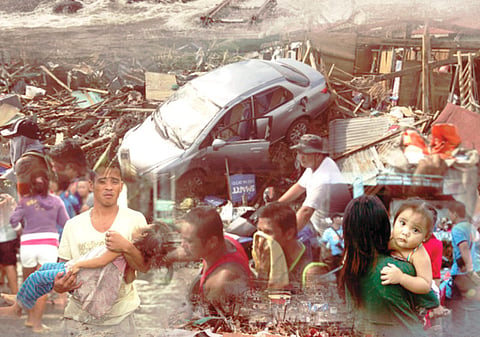The implication of gathering criticism
President Aquino has lacked his usual composure, coming across at times as arrogant and even insensitive

President Benigno Aquino III is facing increasing pressure over his government’s response to the biggest natural calamity to hit the Philippines in living memory.
Amid widespread criticism over the speed of its reaction after typhoon Haiyan devastated parts of the central section of the archipelago last Friday, and of comments by the president widely condemned as arrogant and harsh, the president’s office said on Thursday that Aquino had directed government agencies “to come out with a mechanism that coordinates humanitarian action with the international community to speed up relief and rehabilitation efforts” for the victims of the disaster.
“This will come out to be one of the largest logistic and relief operation that the Philippine government has ever done in history and the president wanted to make sure that we have aligned everything,” Jose Rene Almendras, Cabinet Secretary, said.
But this is unlikely to be enough to quickly restore the tarnished reputation of a leader seen as one of the most popular and competent Philippines presidents.
As far as political honeymoons go, Aquino’s has been pretty long. When he was elected nearly three-and-a-half years ago as a self-confessed “reluctant president”, few Filipinos expected a great deal of a man whose main qualification to lead his country of 97 million people was his illustrious family name.
Commonly known as “Noynoy”, he raised expectations by waging war on corruption and presiding over an impressive economic resurgence that, against all odds, has made the Philippines a favourite of emerging market investors.
Aquino, the son of former president Corazon Aquino and Benigno Aquino Jr, a national hero assassinated in 1983, even managed to conclude a peace agreement with Muslim separatists who had been waging a guerrilla war in the southern island of Mindanao since the 1970s.
In recent months, though, even before his administration was tested by last week’s catastrophic events, the shine had begun to wear off Aquino’s squeaky clean image. Public officials became engulfed in a scandal involving some $200 million (Dh735.6 million) in “pork barrel” funds and Aquino was widely accused of targeting only opposition politicians in the widening investigation.
The implication of gathering criticism was that his own administration was not above reproach. Now, typhoon Haiyan, dubbed by critics as “typhoon Noynoy”, has battered his reputation further.
Even taking into account the unprecedented strength of the typhoon and the resultant storm surge, Philippines authorities have been exposed as unprepared for a major disaster.
In the most affected areas, including Tacloban, in the centre of the strung-out archipelago where the storm hit hardest, relief aid has been first to arrive not from the Philippines government, but from foreign relief agencies and states, including the US. Even now, a week after the storm first struck, in some more remote areas, the Philippines state remains practically invisible.
Storming out
Aquino has lacked his usual composure, coming across at times as arrogant and even insensitive. In an interview with CNN, he dismissed estimates that the death toll would rise to 10,000, saying such inflated numbers were the product of “emotional trauma”.
While no one knows how high the death toll may climb, Aquino’s estimate of some 2,000 already looks optimistically low.
The president, who travelled to Tacloban last Sunday, is also accused of storming out of a meeting with local officials and of being harsh in his criticism of looters. Conversely, when confronted by a businessman who complained of having been attacked by a mob, the president is said to have replied dismissively: “But you did not die, right?”
Jojo Robles, a columnist writing in the Manila Standard, said Aquino was seeking to blame everyone for the handling of the disaster but himself. “Aquino has proven that he is obviously not up to the task,” he said.
Not everyone is critical of the president. Brillante Mendoza, a film director, said it was unfair to criticise the government, given the difficult logistics of a country stretched out across multiple islands. “I don’t think it’s the time to dwell on these things. The president is intelligent and is doing his best,” he said.
Speaking from Manila, which he said was largely unaffected by the storm, he conceded the gravity of the situation in the centre of the country. “Based on news reports, we can see that there really is a major problem,” he commented.
Some of the criticism may indeed prove to be overdone, linked to the inevitable confusion and high emotions that accompany such a devastating crisis. But the fact that it is being made at all suggests that Aquino’s long streak of political good fortune may have ended.
— Financial Times


